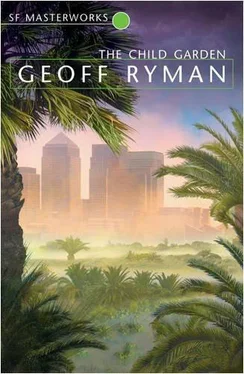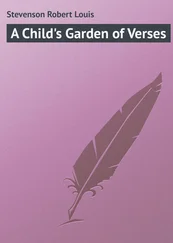It was laying cable. The power would soon be on again. There would be metal, sent back along the Slide. The world was going to be rich again, and hung with light. There would be stages big enough for Paradiso. There would be no need for mines in the Antarctic.
Four billion hours and counting.
And all of this will go, sometime. Here it was, in front of her, history, if only for someone else.
Everything goes, everything is lost, eventually. But if something is good, it doesn’t matter what happens. The ending is still happy.
We might have lived in the Antarctic, my love. We would have visited your mother, and you would still have sung, if only to sled dogs. We might have run away to Scotland and been sheep farmers in smelly old jumpers. Or we could have stayed as we were until we hated each other.
Or there could have been this. You will be great, and I will stand in the wings and hear your music, and the applause will rise up.
Endings don’t mean anything. Meanings lie where the world takes its breath, and that is always now. And suddenly, over Waterloo Bridge, the black balloon rose up again, in sunlight this time. Light was reflected from its full black cheeks. It was blowing itself backwards, as it rose into the sky. It blew itself, and was blown. It had been made by others, but it was also entirely itself. That’s me, thought Milena. From the gondola that hung underneath it, people waved. There were coloured streamers. Was there a wedding? Milena waved back, and saw herself, as if she were the balloon. She was tiny, standing on the bridge, but the gesture, the wave of greeting, was clear.
Ten billion and counting.
There was a lot to do. Seventeen years old, Milena thought. She only had another seventeen, maybe eighteen years left to live. Time to get busy. She began to walk, as if counting her steps as well. Time was the problem. She thought she could control it. Instead, time swept her up, blew her on her way, through her life, without Rolfa for all her life. But whatever work she did could not be negated, not even by the death of the sun. That would only be an ending.
Twelve billion and counting.
Milena walked backwards to keep her face toward the sunlight, unaware that she was humming to herself.
Just a Dog of a Song. But…
Jump.
Somewhere else, the voices of the Consensus were falling like rain, calling
Rolfa
Rolfa
Rolfa
Rolfa
Rolfa.
They were the voices of children, wounded and anxious and eager for love. And they said:
It wants to hear your music. The Crown of the World wants you to sing.
And a pattern gathered itself into thought, and seemed to say, in mild surprise. Oh, really? Very well then. It was a pattern that was used to singing in the dark and imagining music out of silence.
There was a blast of imagined light.
It was engulfing, blinding, and the voices scattered like cherubim. With the light, there was the striking of a great chord, made of many voices and instruments, a sound like the beginning of the world, or the end. The sound was sustained. Very faintly at first, like a ringing in the ear, came a voice.
In the end is my beginning.
A hidden thought followed the words like a dart: and this the end of the Comedy, and the music at the end is the same as at the beginning.
The one who had come awake could orchestrate thought and sensation. The blinding light seemed to fade; eyes were adjusting to it. There were clouds, mountainous, rumpled, going off into many layers of distance, with shafts of light and lakes of shadow and cloud-valleys full of icy mist. There was an infinity of light and air, a world without end.
The audience felt wind in its face and a throbbing of blood in its temples and cold air being pulled into its lungs — it felt nostalgia for flesh. And out of the mists, Angels came streaming in black, their round and innocent faces painted white. Their robes and lips and eyesockets were black.
The Angels were the Vampires. They had been a chorus all along. There was T. S. Eliot, his face painted green to make him look ill. There was Madame Curie, glowing with her discovery. T. E. Lawrence had the marks of the lash, and the Brontes coughed, their arms about each other. The Vampires of History held each other back. They bore each other up. The signs of health were indistinguishable from the signs of disease.
The song they sung was this:
All’alta fantasia qui mano possa…
Here high fantasy failed
Yet, like a smoothly spinning wheel
Desire and my will were turned as one by Love.
Then everything dropped out. The audience fell into night, into a sky dark and blue and full of stars. The darkness, the sky, had been below the light.
The Love that moves the sun and all the other stars.
Drums beat. The imagined music drew to a firm and conclusive end. The thought came that this was a prediction: we will all live in the spirit. Rolfa was free.
Then, silence.
BOOK TWO
For Milena Who Makes the Flowers
or
A Change of Climate
To run on better water now, the boat of my invention
Shakes its sails and leaves away to stern
That cruel stretch of sea.
And I will sing of this second kingdom
Where the human soul is purged
Made fit to leap up into Heaven.
Here let dead poetry rise again.
CHAPTER EIGHT
Where is Rolfa?
(A Change of Climate)
Milena remembered the face of Chao Li Song.
His hair and his beard were black and his eyes were narrow, hard and smiling. This was not an old saintly man, but a young Chinese outlaw who attracted women.
‘The problem,’ said the outlaw, ‘is time.’
His two hands moved, one forwards, one backwards. ‘Time moves forward with the expansion of space. But space is also contracting, and time is moving backwards.’ The two hands met, as if in prayer. ‘They intersect at Now. Now is always timeless.’
There was a whirring sound of cameras. ‘There is no single flow of time. There is no cause and effect.’ The outlaw pulled a face that was childishly sad. ‘There are,’ he said, ‘no stories.’
Four years after Rolfa left her, Milena was Read by the Consensus. She was made into a story. A wave of gravity and thought slammed into her, filling her. All her memories, all her separate selves were inflated, like balloons. Her past was made Now.
She remembered the night the power came back on. She was standing on Hungerford Footbridge, and it was crowded with strangers, crowded with friends.
The cast of Love’s Labour’s were with her, Berowne and the Princess. Cilia was with her as well. They sheltered in a viewing bay on the bridge, a mass of people pressed around them. Along the river, the embankment was full of people. It was late in the summer evening, and the sky was a silver blue. It was warm and mild and the air moved in currents like silk ribbons. The Shell-Mex, a great grey building across the river, stood against the light in the west.
Berowne was pregnant. Most people thought he looked grotesque. The foetus was attached to his bowel, and all the back of his body was swollen with it. He had to sleep in a sling. His beard had gone thin and his teeth were grey and fragile, speckled with white like a dog’s coat. He would have to grow new teeth after the birth. If he sat down suddenly, he would the. He would probably the anyway, giving birth.
Milena thought he was very brave. Coming out with her tonight was dangerous. Life itself was dangerous, and there was something in Berowne’s acceptance of it that Milena found admirable.
Читать дальше












